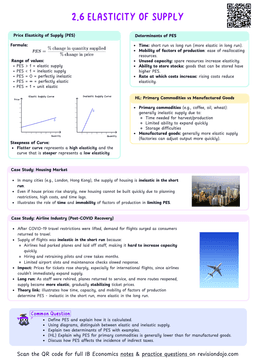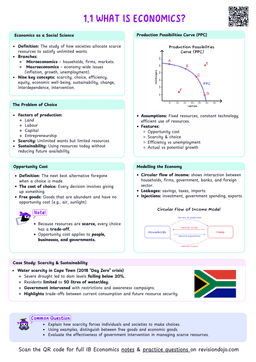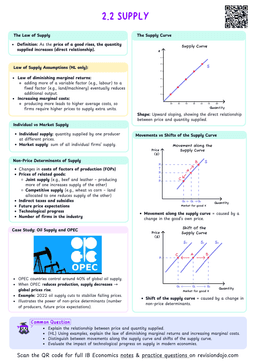Trading Bloc
Group of countries encouraging free trade and economic integration through the reduction of trade barriers between them.
Trading blocs or high levels of economic integration in general provide a multitude of the benefits experienced in free trade in the long run. These are discussed below:
Advantages of Trading Blocs
Trade Creation (HL Only)
- When economies enter a trading bloc, trade between countries alter as trade between member countries becomes prevalent due to reduced trade barriers.
- This causes trade with non-member countries to decrease as common trade restrictions are applied.
Trade Creation
Scenario where lower cost imports are replaced with higher cost imports or domestic production.
Country A initially imports laptops from Country C, where the price, including a 10% tariff, is $1,100. Meanwhile, laptops from Country B cost $1,200, making Country C the preferred trade partner. However, when Country A joins a trading bloc with Country B, tariffs on B’s goods are eliminated. This reduces the price of laptops from Country B to $1,000, making them cheaper than those from Country C. As a result, Country A switches its imports from Country C to Country B, increasing trade within the bloc and benefiting consumers with lower prices, while reducing exports for producers in Country C.
Greater Access to Markets offer potential for Economies of Scale
- Entering a trading bloc provides firms the ability to sell goods to member countries without much difficulties, which leads to an increase in exports.
- As the economy now has free trade with other economies, firms can grow substantially as the size of the market increases, hence export increases.
- This allows firms to achieve lower average costs (theory of economies of scale).
Greater Employment Opportunities
- Discussed previously, if a trading bloc becomes a common market or monetary union, it allows for free movement of factors of production such as capital and labour.
- Therefore, unemployed individuals in an economy can seek for employment or work in other economies where more opportunities may be present.
Stronger bargaining power
- Oftentimes, individual countries lack bargaining power in multilateral organisations (such as WTO), especially if they are geographically or economically small.
- When a country is in a trading bloc, they can therefore bargain as a trading bloc, which holds much greater power.
- This increases chances of achieving their respective objectives as they are more likely to be listened to.
The EU negotiates trade deals as a single entity, giving it more leverage than individual member states would have on their own.
Greater Political Stability and Cooperation
- Being part of a high level of economic integration such as trading blocs reduce the probability of hostile behaviour arising between countries.
- This is because all economies become interdependent through increased trade, labour, financial flows, etc.
- In fact, it promotes political stability and fosters cooperation.
The EU was founded in part to promote peace and cooperation among European nations after World War II.
Disadvantages of Trading Blocs
Trade Diversion (HL Only)
At the same time, the opposite of trade creation could occur.
Trade Diversion
scenario where higher cost imports from a member country replace lower cost imports due to the formation of the trading bloc.
- This problem appears as the economy may need to impose the common trade restriction set by the trading bloc to non-member countries.
- Previous lower cost imports are much higher now due to trade policies.
- Therefore, the economy is prompted to switch to importing the goods from member countries.
- This is inefficient and can lead to higher prices for consumers on goods and firms for raw materials.
Don’t confuse trade creation with trade diversion. Trade creation benefits by having trade without restriction, hence lowering costs, while trade diversion raises costs by shifting trade to less efficient producers.
Loss of Sovereignty
- For a country, obtaining membership in a trading bloc often requires them to cede some control over domestic decision making power, hence their economic policies.
- The power is provided to the supranational authority of the trading bloc.
- The loss in sovereignty of a member country increases as the power of economic integration increases.
Challenge to Multilateral Trading Negotiations
- Even though trading blocs is an improvement over trade protection, as free trade occurs between member countries, it acts against WTO's approach of reducing barriers for trade for all countries.
- This is because economists believe that having multiple trading blocs could create conflicts of trade between blocs.
- Further, large trading blocs might impose heavy trade barriers on non-member countries with the goal of limiting trade.
- Therefore, both scenarios slows down the goal of trade liberalisation globally.
(HL Only) Remember that trade creation and trade diversion are key concepts for evaluating the efficiency of trading blocs. Focus on how these dynamics affect consumer welfare and resource allocation.
Case studyBackground
Trading blocs are groups of countries that agree to reduce or eliminate trade barriers between themselves while maintaining common trade restrictions against non-member nations. These blocs can range from free trade agreements (FTAs) to customs unions, common markets, and economic unions. They are created to boost trade, promote economic growth, and enhance cooperation among member states. However, trading blocs also come with challenges that can negatively impact non-member countries and domestic industries.
The European Union (EU), United States-Mexico-Canada Agreement (USMCA), and the Association of Southeast Asian Nations (ASEAN) are examples of some of the most influential trading blocs.
The European Union and Benefits of a Trading Bloc
The European Union (EU) is a single market and customs union comprising 27 member states. It offers one of the most advanced levels of economic integration in the world, facilitating free trade, free movement of people, and unified trade policies.
Trade Creation & Market Access
- The EU accounts for approximately 15% of global trade, making it one of the largest economic entities.
- In 2022, intra-EU trade was valued at €3.5 trillion, demonstrating how the removal of tariffs has boosted trade among member countries.
- The removal of tariffs and quotas has made European businesses more competitive, increasing trade between Germany, France, Italy, and Spain, among others.
Economies of Scale & Business Expansion
- By having access to a larger consumer base (448 million people in 2023), businesses in the EU can expand production and lower average costs, benefiting from economies of scale.
- For example, Airbus, a multinational aerospace corporation, takes advantage of the EU single market by having production facilities in multiple member states without trade barriers.
Greater Employment Opportunities
- The EU allows free movement of labor, enabling workers to seek employment in any member country.
- In 2023, over 14 million EU citizens lived and worked in another EU country, contributing to higher employment rates and skill transfer.
- Poland, for instance, has benefited from labor migration, as Polish workers can easily find employment in Germany and the UK (before Brexit), improving remittance inflows.
Stronger Bargaining Power
- As the second-largest trading bloc, the EU holds significant power in global trade negotiations.
- The EU negotiates as a bloc in the World Trade Organization (WTO), giving it greater influence than individual countries.
- In 2021, the EU negotiated a free trade agreement with Japan, creating the world’s largest open trade zone.
Political Stability & Economic Cooperation
- EU integration has promoted peace and stability in Europe, with economic interdependence reducing the likelihood of conflicts.
- The EU was awarded the Nobel Peace Prize in 2012 for its role in maintaining peace through economic integration.
The Impact of Trading Blocs on Non-Member Countries and the African Union and Trade Diversion
While trading blocs bring significant economic benefits, they can also create challenges for both member and non-member countries.
Trade Diversion & Rising Costs
- When a country joins a trading bloc, it is often required to impose tariffs on non-member countries, even if they previously had cheaper trade agreements.
- The African Continental Free Trade Area (AfCFTA) was established in 2018, aiming to eliminate 90% of tariffs on intra-African trade.
- However, African nations trading with the EU and China face higher tariffs when importing goods due to trade diversion.
- In 2019, Kenya faced higher import costs on Chinese-manufactured industrial equipment after aligning with the East African Community (EAC) trade regulations.
Loss of Sovereignty & Policy Restrictions
- Membership in a trading bloc limits a country’s ability to make independent economic policies.
- For example, the UK left the EU (Brexit in 2020), partly due to concerns over loss of sovereignty and restrictions on independent trade policies.
- The Common Agricultural Policy (CAP) of the EU has also been criticized for restricting member states from creating their own agricultural policies.
Challenges to Global Trade Liberalization
- The rise of regional trading blocs, such as the USMCA and the EU, has led to increased economic fragmentation, making it harder for organizations like the WTO to push for global free trade.
- Larger trading blocs, such as the EU, often impose tariffs on non-member countries, making it harder for developing nations to compete in global trade markets.
- For example, African farmers face high tariffs on agricultural exports to the EU, reducing their ability to compete with European producers.
Questions
- Define the term trading bloc and explain how it differs from a free trade agreement.
- Identify and explain two advantages of a trading bloc, using examples from the EU case study.
- Describe the concept of trade creation and explain how it benefits businesses in a trading bloc.
- Analyze how the European Union has contributed to economies of scale for businesses operating in multiple member states.
- Explain how the loss of sovereignty due to trading bloc membership influenced Brexit and its economic consequences for the UK.
- Evaluate the impact of trade diversion on non-member countries, using examples from the African Union and China.
- "While trading blocs increase trade and economic cooperation, they create barriers to global trade liberalization." Discuss this statement using real-world examples from the EU, USMCA, and AfCFTA.
To what extent do economic benefits justify the loss of sovereignty in trading blocs? Consider how this question relates to the broader debate about globalisation and national autonomy.


